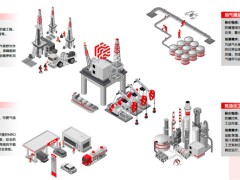据彭博社6月15日报道,大型石油公司面临的压力越来越大,迫使许多公司承诺减少其主要化石燃料的开采。他们还警告称,最终结果可能并不是全球排放量的减少。
壳牌首席执行官范伯登(Ben van Beurden)表示:“假设壳牌今天决定停止销售汽油和柴油,这肯定会减少壳牌的碳排放,但这丝毫无助于世界碳排放的减少。对燃料的需求不会改变,人们将在其他服务站给他们的汽车和送货卡车加油。”
这不是一个新的论点。从历史上看,石油需求只会增加。长期以来,石油行业一直用这一趋势来解释,为什么在向清洁能源转型的过程中需要继续供应石油。
真正的风险在于,壳牌等国际石油巨头将市场份额拱手让给了国有石油公司,这些公司在排放报告方面不那么透明,对私人投资者的责任也不那么大。但这一次可能会有所不同,因为越来越多的人相信,石油需求峰值可能即将到来。
商业环境也有利于减排。公用事业公司和汽车制造商已经受益于可再生电力成本和锂电池成本的持续下降。股东们(埃克森美孚公司就投票选出了三位有环保意识的董事)以及法院(命令壳牌在十年内减排45%)都认为,石油和天然气公司需要整顿自己的行为,以提高盈利能力,帮助世界实现气候目标。
这就是为什么石油公司把他们的论点更进一步向清洁的未来推进。范伯登表示:“我们需要与社会、政府和我们的客户一起努力,实现全球能源系统真正有意义的改变。这种变化必须解决对碳基能源的需求,而不仅仅是它的供应。”
那么,石油公司该如何减少对石油的需求呢?他们至少有三个杠杆,即投资清洁技术,进入清洁能源行业,游说气候政策。
普华永道(PwC)表示,作为收入的一部分,能源行业在研发方面的投入是最少的。国际能源署(IEA)的数据显示,令人担忧的是,就连政府在能源研发方面的支出也没有大幅增加。要知道,为加速创新提供资金,可以加速能源转型。
石油公司还可以投资清洁能源业务,如可再生发电和配电、电动汽车充电、可持续航空燃料、低碳氢和碳捕获和封存等。
这不是一个简单的转变。以电动汽车行业为例。理想情况下,石油公司希望通过为电动汽车提供动力来弥补向内燃机汽车消耗汽油造成的收入损失。但据彭博社估计,快速充电网络可能只占电动汽车所需能源的不到一半。此外,由于电动汽车非常高效,它们行驶相同里程所需的能量汽车不到一半。据估计,电力的利润率通常比燃料的利润率要小。这意味着石油公司很可能最终会减少每辆电动汽车的能源供应,并在供应的能源中获得较低的利润。
这些数据可能令人沮丧,但也不全是坏事。较早进入电动汽车充电领域的石油公司最终将获得比为汽车提供燃料更大的市场份额。同样也适用于可再生电力和可持续航空燃料。可再生电力可以替代天然气发电厂,可持续航空燃料可以替代传统燃料。
重要的是,低碳氢和碳捕获技术提供了新的收入来源。一家用氢气替代煤炭的钢铁制造商是一家石油公司的潜在客户,需要帮助运输和掩埋二氧化碳的融合性产业链处理公司也是一个商机。然而,这些行业刚刚起步,甚至还不存在,石油公司将不得不利用他们的游说能力来推动创造这些业务的政策。
投资者维权组织Follow This的创始人马克·范·巴尔(Mark van Baal)表示:“大型石油公司的发展历程表明,它们能够成功地游说政府减缓减排法规。不难想象,他们会采取相反的角度,即让人们不想要化石燃料。人们需要能源,而且越来越需要清洁能源。”
王佳晶 摘译自 彭博社
原文如下:
What Oil Companies Can Do to Cut the Demand for Oil
Increasing pressure on major oil companies has forced many to make promises to reduce the extraction of their main fossil fuel. They also warn that the result may not be a reduction in global emissions.
“Imagine Shell decided to stop selling petrol and diesel today. This would certainly cut Shell’s carbon emissions,” Chief Executive Officer Ben van Beurden wrote on linkedIn last week. “But it would not help the world one bit. Demand for fuel would not change. People will fill up their cars and delivery trucks at other service stations.”
It’s not a new argument. Historically, oil demand has only gone up. It’s a trend that the industry has long used to explain why it needs to keep supplying oil even as it transitions to clean energy.
There’s a real risk that the market share ceded by international oil giants such as Shell goes to national oil companies, which are less transparent in reporting emissions and less accountable to private investors. But this time might be different, with a growing number of people convinced that peak oil demand may be in sight.
T he business environment also is conducive for cutting emissions. Utilities and automakers are benefiting already from a sustained decline in renewable electricity costs and lithium-ion batteries. Shareholders, like the ones that voted in three climate-minded directors at Exxon Mobil Corp., and courts, like the Dutch one that ordered Royal Dutch Shell Plc to cut emissions 45% this decade, are taking the view that oil and gas companies need to clean up their act to improve profitability and help the world meet climate goals.
That’s why oil companies are taking their argument one step further. “We need to work together, with society, governments and our customers to achieve real, meaningful change in the worldwide energy system,” van Beurden wrote. “And this change must address the demand for carbon-based energy, not just its supply.”
So what can an oil company do to reduce the demand for oil? They have at least three levers: invest in clean technologies, move into clean-energy businesses and lobby for climate policies.
As a share of revenues, the energy industry spends some of the least money on research and development, according to PwC. What’s worrying is that even government spending on energy R&D has not increased substantially, International Energy Agency data shows. Providing funds to speed up innovation could accelerate the energy transition.
Oil companies also can invest in clean-energy businesses, such as renewable electricity generation and distribution, electric-vehicle charging, sustainable aviation fuels, low-carbon hydrogen and carbon capture and storage.
It’s not a straightforward switch. Take the explosion of electric vehicles, for example. Oil companies ideally would like to make up for the revenue lost from selling gasoline to internal-combustion engine cars by powering EVs instead. The trouble is that fast-charging networks are likely to be responsible for less than half the energy EVs need, according to BloombergNEF’s estimates. Also, because EVs are highly efficient, they need less than half the energy to travel the same number of miles as an ICE car. And the profit margins on electricity are typically smaller than those on fuels, according to BNEF’s Ryan Fisher. That means oil companies are likely to end up supplying less energy per EV and make lower profits on the energy they do supply.
The math may be discouraging, but it’s not all bad. Oil companies that get into EV charging early could end up enjoying a larger share of the market than they did serving fuel to ICE cars. Similar calculations can be made for renewable electricity, which can replace gas power plants, and sustainable aviation fuels, which replace conventional fuels.
Crucially, technologies such as low-carbon hydrogen and carbon capture offer new streams of revenue. A steelmaker replacing coal with hydrogen is a potential customer for an oil company. A cement company needing help to transport and bury carbon dioxide is a business opportunity. Yet these industries are nascent or don’t exist yet. That’s where oil companies will have to use their lobbying power to push for policies that will create those businesses, said BNEF’s David Doherty.
The history of major oil companies has shown that they can successfully lobby governments to slow down regulations to cut emissions. It’s not hard to imagine they could do the opposite, says Mark van Baal, who founded the activist-investor group Follow This. “People don’t want fossil fuels,” he said. “People want energy, and increasingly clean energy.”
免责声明:本网转载自其它媒体的文章,目的在于弘扬石化精神,传递更多石化信息,并不代表本网赞同其观点和对其真实性负责,在此我们谨向原作者和原媒体致以敬意。如果您认为本站文章侵犯了您的版权,请与我们联系,我们将第一时间删除。







